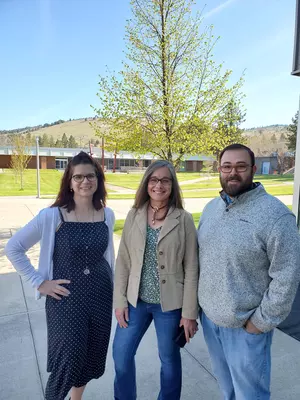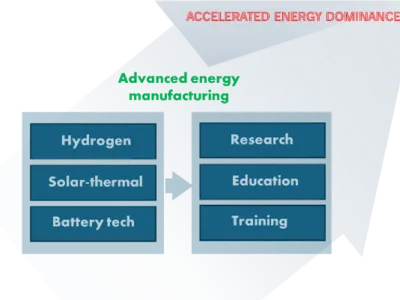
Oregon Institute of Technology (Oregon Tech) faculty and students are conducting research to improve communities around the University. What began as a research study on air quality and hospital burdens has evolved into an opportunity for community betterment and nationwide recognition.
In 2019, Oregon Tech faculty began working with students across four academic programs — Respiratory Care, Environmental Sciences, Population Health Management, and Geomatics — to better understand the impacts of poor air quality in Southern Oregon and help hospitals prepare for capacity burdens that may affect their facilities. The faculty team consisted of Adelaide (Addie) E. Clark, Ph.D., associate professor of Natural Sciences; Kyle Chapman, Ph.D., associate professor of Humanities and Social Sciences; Sarah Fitzpatrick, associate professor of Respiratory Care, now at Asante Rogue Regional Medical Center; and Kerry Farris, instructor of Natural Sciences.
To conduct the initial research, the group worked with Asante, which has hospitals in Ashland, Medford, and Grants Pass, and the Oregon Department of Environmental Quality, which has six air quality monitors throughout the Rogue Valley. The data compiled from the Rogue Valley allowed the group to create tools for hospitals to prepare for emergencies and understand their capacity issues and burden.
“We hope to help hospitals create a more detailed plan to approach air quality emergencies,” said Dr. Chapman. “Wildfire plans have historically included things like, ‘Does a hospital have the ability to handle burn patients or smoke inhalation?’ but they do not always have a plan for approaching more widespread, but less severe, situations such as respiratory issues from people miles away from an emergency. We’re finding that this could actually be a significant problem.”
The project was funded through the Oregon Tech Foundation’s Innovation Fund and other grants Dr. Chapman and Dr. Clark received related to air quality. Chapman said the group is approved to apply for $1 million in funding from the federal fiscal year 2022 budget bill under the Labor, Health and Human Services, and Education bill signed into law in March. With additional funding, the group could expand research into the Klamath Basin, develop an emergency preparedness plan for Klamath County, and possibly expand the study into cardiovascular research.
“We are still working on the proposal process, but this funding has been earmarked for Oregon Tech to undertake this research to help healthcare professionals and our healthcare organizations, said Dr. Chapman.
The project also leads to valuable partnerships, such as with the Oregon Health Authority, which is working with Oregon State University (OSU) and Oregon Health and Science University (OHSU) to conduct similar research studying the impact of poor air quality on cardiovascular conditions.
“This project has opened up a door for Oregon Tech to be included in big conversations happening in Oregon,” said Dr. Clark.
Dr. Chapman added, “Additionally, we are now part of a Klamath County project on air quality and birth outcomes being led by OSU, and Oregon Tech is working alongside OHSU and county health group.”
The researchers have also been invited to contribute to the Oregon Climate Assessment, which was commissioned by the State of Oregon and is being conducted by the Oregon Climate Change Research Institute.
“This is one example of innovation coming out of a relatively small but tight-knit school,” said Dr. Clark.
###








